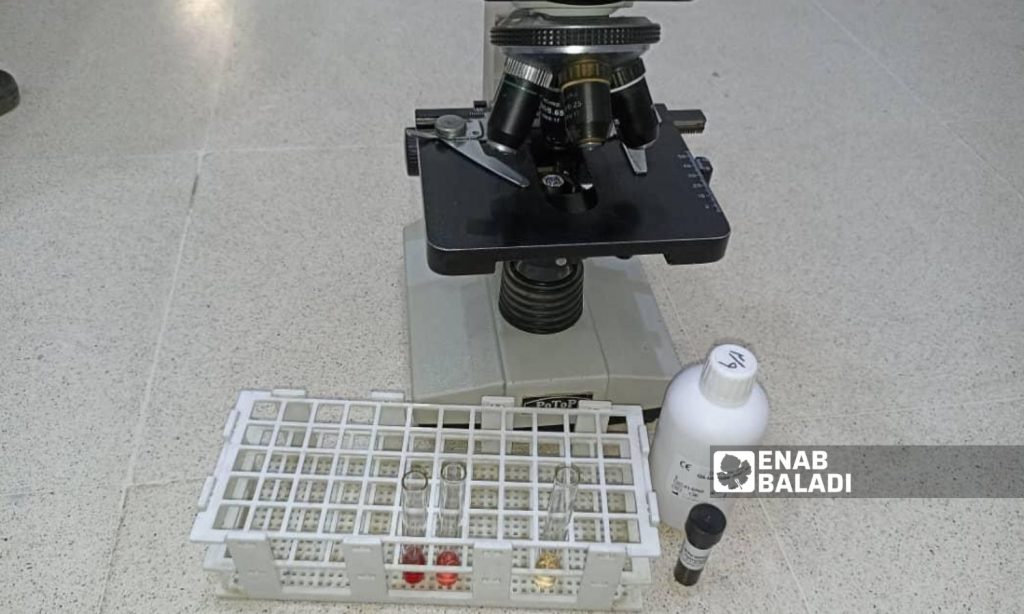Daraa – Halim Muhammad
For the past six months, medical clinics in the southern governorate of Daraa have been witnessing a severe shortage of “mixed insulin,” which has raised the concern of people with diabetes.
Residents spoke to Enab Baladi about the complete lack of this substance in public clinics since the beginning of last April, while it is available in pharmacies and private clinics.
Free, but not available
Diabetic patients get free insulin from the diabetes clinic, Red Crescent clinics, and some public hospitals, based on a card that the patient carries called a “diabetic card.”
The director of the Daraa al-Balad clinic, Dr. Ziyad Mahameed, told Enab Baladi that insulin has not been available in government clinics in Daraa governorate since the beginning of this year, despite the repeated request to provide it from the Ministry of Health.
He added that the administration of the Daraa al-Balad dispensary sent an official letter to the Health Directorate in Daraa to provide it, referring to promises to secure it soon, without specifying a time period.
Mahameed pointed out that insulin is an essential medicine, as it is indispensable for diabetics.
Diabetes mellitus is one of the common chronic diseases among humans, affecting adults and children, and is represented by the inability of the body to produce the hormone insulin or the resistance of the body’s cells to the secreted hormone and its lack of response to it, and this is what causes high glucose levels in the blood beyond the normal limit.
Beyond patients capacity
Fatima used to receive insulin as a free medical prescription from the diabetes clinic in the center of Daraa governorate, which forced her, after losing it, to buy it from private pharmacies. She needed two packages per month at a price of 40,000 Syrian pounds each.
Fatima, 55, of Tal Shihab town in the western countryside of Daraa, has been suffering from diabetes for about ten years.
She told Enab Baladi that buying insulin has become a heavy burden on her family, as it cannot be dispensed with or postponed, and that she uses financial donations from her expatriate relatives to be able to buy medicine.
In the western countryside of Daraa, the 60-year-old Ni’ma is looking for a pharmacy that might sell her insulin medicine on credit due to its high price.
Ni’ma told Enab Baladi that she fears that she will be unable to buy it if it continues to be discontinued from public clinics in the future, as she used to get it for free from the diabetes clinic in the governorate.
She mentioned that insulin interruption in the diabetes clinic has accumulated debts that are still increasing, as she cannot dispense with medication.
Daraa-based pharmacist Muhannad told Enab Baladi that diabetic patients need insulin on an ongoing basis, in quantities determined by the doctor based on the patient’s condition, which varies from one patient to another.
Muhannad added that the patient generally needs between one and two packages per month, and the price of one package ranges between 40,000 and 50,000 SYP (about $5.9).
Diabetes has two types; the first is Insulin-dependent (type I), and the second is non-insulin-dependent diabetes mellitus (NIDDM) which was previously called the “adult-onset diabetes” type, according to the pharmacist.
Regarding the lack of insulin from public clinics, the pharmacist said that this shortage has become common for some time, and whether or not it is available is subject to the government’s ability to import it.
Common disease
Diabetes mellitus is a common disease in Daraa governorate, as the number of patients with this disease has reached 12,347, of whom 1,531 are given “mixed insulin,” according to what the director of the diabetes center in Daraa governorate, Nael al-Zoubi, told the government Tishreen newspaper last April.
Al-Zoubi added that diabetes clinics take care of a large number of patients because the services are provided free of charge.
The number of people with diabetes within the areas controlled by the Syrian regime has reached about 190,000 people registered within the health directorates, according to the director of communicable and chronic diseases at the Ministry of Health, Zuhair al-Sahwi, speaking to the official Syrian News Agency (SANA) in November 2022.
In 2012, diabetes was a direct cause of 1.5 million global deaths, and in 2021 it caused 6.7 million deaths.

